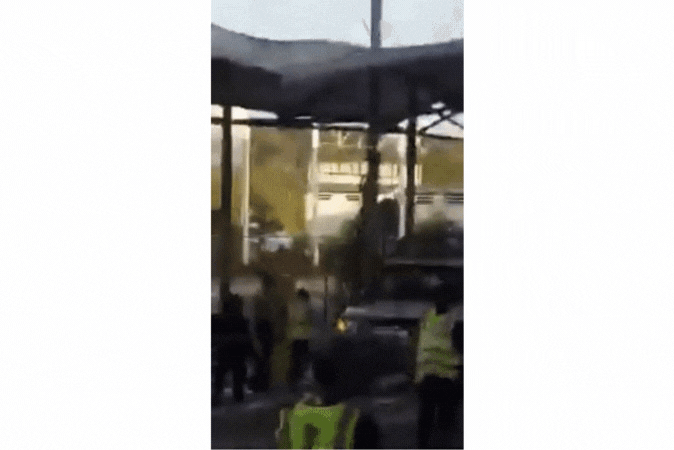The very public confrontation between two private security firms at Port Moresby’s Jacksons International Airport has highlighted the often fractious relations between PNG’s private security companies in this highly competitive industry. The fight between Kuima Security and Asila Security Firm guards started in the early hours of Tuesday 22 March, ostensibly because of a dispute over the changing of security contractor by the National Airport Corporation (NAC). According to reports, the NAC terminated a long-running contract with Kuima Security and awarded a new contract to Asila Security Firm. It appears that guards from the former organisation were unhappy about being suddenly unemployed and returned to give their newly employed competitors a beating.
Referring to the incident as “an act of domestic terrorism” on a vital government installation, RPNGC NCD Commander Anthony Wagambie Junior stated that nothing like this had ever happened before. However, our ongoing research with private security providers across the country indicates that it is not uncommon for violence to erupt between PNG’s growing number of security firms. Indeed, we have heard many tales about fights between company personnel. A number of respondents told us that conflict is particularly likely when a business or government department replaces one security firm with another. When guards from the ousted security company lose their job, some take their frustrations out on the newly employed guards.
The violence between security companies is, in large part, a product of both the competitive and macho nature of the industry. Some clients regularly change security providers and often offer contracts with razor thin margins, which heightens competition and increases the precarious nature of employment. According to respondents, some firms differentiate themselves through developing a fierce reputation, which can spill over into public violence. Stephanie Lusby has also documented the sometimes hyper-masculine nature of the security industry, which she argues helps to perpetuate violence against women. This quality is also reflected in the propensity for military style uniforms and other accoutrements among elements of the industry.
While the altercation at Jacksons Airport was between two larger firms, our interviews suggest that relationships between small and large companies tend to be particularly adversarial. Respondents from large companies often described smaller companies as responsible for poor standards and underpaying their employees. A Lae-based manager said that people often tested the commitment of smaller and new firms:
One thing that happens when new players come up is that people test them, they try to see if they are weak. The new players need to be strong and aggressively fight back, otherwise they won’t last.
Despite the proclivity for fisticuffs, our respondents also noted that disputes between firms were often followed by protracted efforts to restore harmonious relations between the rival entities. For example, one senior private security manager recalled a conflict between his firm and another resulting in one guard being stabbed:
It was sorted out through a compensation ceremony. We gave pigs and 14,000 kina compensation, [the other company] gave back 6,000 kina. We are good mates now.
These restorative approaches involving reciprocal acts of exchange between the former disputants bear a strong similarity to those following tribal conflicts in parts of the Highlands, and provide a distinctly Melanesian flavour to the resolution of these frictions between rival security companies.
While Commander Wagambie has promised to arrest perpetrators involved in the Jacksons Airport conflict, our research suggests that mediation and compensation should also play an important role in responding to this bust up.
In addition, more needs to be done to address some of the underlying drivers of such conflict.
This means examining the practices of those hiring security firms. This could include efforts to investigate and root out the widespread perceptions of corruption surrounding the awarding of, in particular, government and state-owned enterprise contracts. The seemingly arbitrary and capricious character of such decision-making inevitably inflames rivalry and suspicion between companies and can, as in this case, spill over to open conflict. While there is no evidence as yet of corruption in awarding security contracts at Jacksons Airport, Prime Minister James Marape has called for an investigation into NAC’s management over concerns about nepotism and corruption. Indeed, the NAC has a troubled past which inclines some to believe that perceptions of favouritism could have played a role in this conflict.
The private security industry itself also needs more effective regulation. In his comments on the incident at Jacksons Airport, Commander Wagambie called on the Security Industry Authority to look into the operations of security companies involved in “uncivilised behaviour”. As we have noted elsewhere, PNG is one of only three Pacific countries (the others being Fiji and Tonga) to have a dedicated legislative framework to regulate its private security industry. The key body charged with implementing this framework is the Security Industry Authority, which is desperately in need of strengthening. Proposed amendments to the Security (Protection) Industries Act that are currently awaiting approval could be revised to include provisions to regulate the awarding of contracts and for the provision of mediation services when disputes, such as that between Kuima and Asila, arise.
In sum, the recent Jacksons Airport fracas should be a timely reminder to policymakers that PNG’s growing private security industry, and the organisations that draw on its services, need greater regulation. Without this, it is likely that we will again see security guards attacking one another.
Disclosure
This research was undertaken with support from the Australian Civil-Military Centre. The views are those of the authors only.



These guys come from the primitive part of PNG and bring in their Caveman mentality. Not all Papua New Guineans are like these primitives. Sometimes we wanted to Break away from the rest of the country be ourselves as peace-loving people.